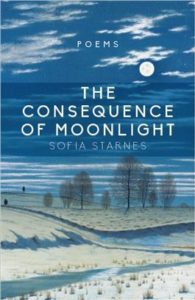The Consequence of Moonlight, the latest collection of poetry by former Virginia poet Laureate Sofia Starnes, reads like a vivid dream. The words, phrasings, and language are almost dreamlike, rather lush, clouded edges that lead the poems from one into another. The 70 poems of the collection are independent and yet not; the reader gradually becomes aware of consistent themes and images.
And yet it’s not all clouded edges. These poems, in their own quiet way, ask vivid questions about relationships, childhood, faith, belief, understanding, and perception. They are like what the title suggests—moonlight may be dreamy and romantic, but it also highlights, accentuates, and often brings into sharp relief. Moonlight has its consequences.
The poems address the experience of being in a new world or being new to an old world; how we speak and communicate with each other; how we understand what the world is about; and the places our hearts and souls lead us in that understanding. These are deeply spiritual poems, especially exemplified by the ones containing direct references to childhood.
To see the soothing mud tracks—
they were here—
and hear a foreign language turned to clay,
for clay is good for familiarity;
the circus closed last night for the last time
and cockatoos rejoiced—
how strange to us,
compulsive lovers of proximity;
we thought them pleased,
night after tinsel night,
green echoes of our pleasure and our search,
as wingless children, ruffling differently.
The reference to children is deliberate and possibly the major theme of the poems. In an afterword, Starnes notes the references in several poems to a girl named Elena, a name that in Greek is akin to “moon.” She explains that Elena refers back to our being called by name, which we first experience as young children, a first step toward a journey of discovering how we fit in the wider world.

Sofia Starnes
Born in Manila, Starnes of is Philippine-Spanish ancestry and an American citizen since 1989. From 2012 to 2014, she served as the poet laureate of Virginia. She received an advanced degree in English Philology from the University of Madrid, a degree in English Pedagogy from the Instituto de Idiomas in Madrid, and a Doctor of Letters degree from Union College in Kentucky. Her poetry collections include A Commerce of Moments (2003), Corpus Homini (2010), and Fully into Ashes (2011), among others. She’s also edited two anthologies, Four Virginia Poets Laureate 2004-2012: An Anthology and Reader’s Guide and The Nearest Poem Anthology (2014). She lives in Virginia.
The Consequence of Moonlight is a work of faith enfolded in a work of beauty. The idea of moonlight—exhibiting its own beauty in the darkness but in truth reflecting a greater light—is the image and metaphor Starnes fully explores and explains.
Related:
Sofia Starnes reads “A Mode of Permanence” from The Consequence of Moonlight
Photo by Pai Shih, Creative Commons, via Flickr. Post by Glynn Young, author of the novels Dancing Priest, A Light Shining, and the newly published Dancing King, and Poetry at Work.
__________________________

“I require all our incoming poetry students—in the MFA I direct—to buy and read this book.”
—Jeanetta Calhoun Mish
- Longfellow’s “Paul Revere’s Ride”: Creating a National Legend - April 17, 2025
- Poets and Poems: Katie Kalisz and “Flu Season” - April 15, 2025
- Poets and Poems: Michelle Ortega and “When You Ask Me, Why Paris?” - April 10, 2025


Leave a Reply